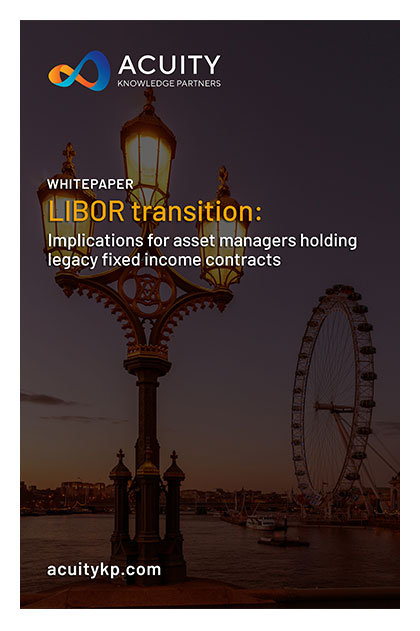
NEW Whitepaper
LIBOR Transition: Implications for Asset Managers Holding Legacy Fixed Income Contracts


Thank you for sharing your Comments
Your file will start downloading automatically
If it does not download within 1 minute,
LIBOR’s discontinuation is shaking up global financial markets. This paper provides a background on LIBOR cessation and the alternatives available to asset managers. It also analyses the impact of LIBOR transition on fixed income market participants, focusing on fallback language in legacy LIBOR-tied contracts. Acuity Knowledge Partners (Acuity) has developed proprietary tools and solutions to help market participants analyse their exposure and transition smoothly from ‘the world’s most important number’.
Key Takeaways
- Legacy fixed income contracts, issued prior to 2018, have inadequate fallback language, providing only for short-term LIBOR disruptions. Newer issuances have incorporated (1) ARRC recommended (USD LIBOR-referenced contracts) hardwired benchmark replacement waterfalls and benchmark replacement adjustments, (2) pre-cessation triggers and (3) permanent cessation triggers into their indentures. Holders of these instruments are, therefore, relatively well placed for LIBOR cessation
- Renegotiating or amending all legacy LIBOR-linked contracts that expire after 2021 is unfeasible, given the sheer magnitude of the volume of contracts outstanding (LIBOR exposure is estimated at USD36tn) and the typical requirement of consent from all or majority noteholders
- Asset managers are advised to analyse their legacy contracts, as contracts with no fallback language may switch to a fixed rate – based on the last LIBOR in effect – or a rate determined by the issuer. Investors holding these contracts could face high uncertainty on rates, duration and other risks, which may diminish expected returns
- Risks and uncertainty surrounding differences in fallback language present an opportunity to investors, who could capitalise on potential arbitrage opportunities from mispriced contracts
- With less than a year left before LIBOR phase-out, asset managers and their research teams will find it unfeasible to allocate resources within existing teams to analyse the fallback language in thousands of contracts
- Leveraging its expertise in the analysis of fallback language across floating-rate notes (FRNs), securitisations, municipal bonds, fixed-to-floating bonds, bonds referencing a swap rate and convertible bonds, Acuity has developed a set of tools to help clients prepare for risks and identify opportunities ahead of LIBOR cessation
- Acuity has developed a proprietary scorecard that ranks fixed income indentures as well prepared, moderately prepared, ambiguous or worst prepared based on their preparedness for LIBOR cessation and helps asset managers analyse their risk. This standardised approach improves comparability across issuers, thereby improving decision-making

